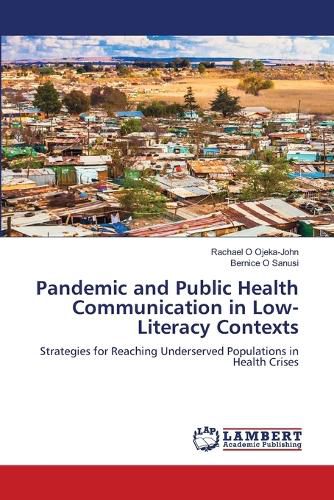Readings Newsletter
Become a Readings Member to make your shopping experience even easier.
Sign in or sign up for free!
You’re not far away from qualifying for FREE standard shipping within Australia
You’ve qualified for FREE standard shipping within Australia
The cart is loading…






Pandemic and Public Health Communication in Low Literacy Context: Strategies for Reaching Underserved Populations in Health Crises explores the critical intersection of health communication and literacy during public health emergencies. Drawing on PhD research conducted in Southwest Nigeria, the book examines how the Nigeria Centre for Disease Control (NCDC)'s communication strategies influenced adherence to COVID-19 safety protocols among non-literate populations. It evaluates the effectiveness of various messaging formats, media channels, and culturally grounded approaches in engaging underserved communities. Using theoretical insights from health communication and behavior change models, the book highlights the barriers posed by low literacy and offers evidence-based recommendations for inclusive, accessible public health messaging. This work is essential for scholars, public health practitioners, policymakers, and NGOs seeking to improve communication outreach during health crises, especially in marginalized or low-literacy settings.
$9.00 standard shipping within Australia
FREE standard shipping within Australia for orders over $100.00
Express & International shipping calculated at checkout
Stock availability can be subject to change without notice. We recommend calling the shop or contacting our online team to check availability of low stock items. Please see our Shopping Online page for more details.
Pandemic and Public Health Communication in Low Literacy Context: Strategies for Reaching Underserved Populations in Health Crises explores the critical intersection of health communication and literacy during public health emergencies. Drawing on PhD research conducted in Southwest Nigeria, the book examines how the Nigeria Centre for Disease Control (NCDC)'s communication strategies influenced adherence to COVID-19 safety protocols among non-literate populations. It evaluates the effectiveness of various messaging formats, media channels, and culturally grounded approaches in engaging underserved communities. Using theoretical insights from health communication and behavior change models, the book highlights the barriers posed by low literacy and offers evidence-based recommendations for inclusive, accessible public health messaging. This work is essential for scholars, public health practitioners, policymakers, and NGOs seeking to improve communication outreach during health crises, especially in marginalized or low-literacy settings.